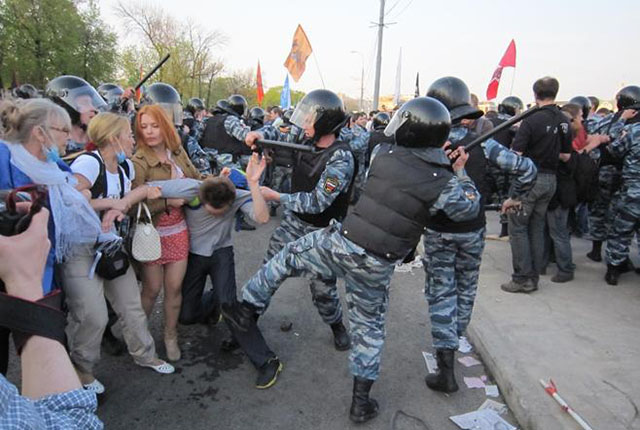The Russian Supreme Court ordered to liquidate the association for protection of human rights Agora. It is the first to fall under the ax of the infamous law on NGOs, on charges of “influencing public opinion”. The Russian Ministry of Justice has filed a lawsuit against Agora charging it with violating the infamous NGO law on “foreign agents”.
Consequently, last Wednesday, the Supreme Court ordered its closure. It is the first time that the Ministry of Justice has demanded the banning of an association for the defense of human rights in Russia on charges of “influence public opinion“. An accusation obviously worrying for the slender freedom of expression under Putin’s rule.
Agora is one of the most famous and active organizations in the country, often drawing international attention on the increasing repression of human rights in Russia. It’s based in Kazan with 40 regional offices throughout Russia, and unites 35 lawyers who provide free legal assistance in the most important court cases against the opposition, as the Bolotnaya activists, the Pussy Riot, the Ukrainian director Oleg Sentsov and the artist Petr Pavlensy. Since its founding in 2005, it won several cases in front of the Constitutional Court of the Russian Federation resulting in six liberticidal laws declared unconstitutional. In 2014 Agora was awarded the Rafto Prize for Human Rights.
Kafka and Orwell
In 2014 Agora has been added to the list of so-called “foreign agents”. The association the organization challenged the decision in courts unsuccessfully, then appealed to the Ministry of Justice to exclude it from the list claiming it had not received foreign funding for more than a year. In response, the ministry has filed a lawsuit for the court to close the organization and the verdict was handed down during the very first hearing.
But, according to the lawyers, the verdict itself violates the Russian constitution, which allows for liquidation only in limited cases, i.e., if an organization carries out activities aimed at undermining the constitutional order, threatening national security or putting citizens lives in danger. None of these allegations has been formally moved against Agora.
The ministry has instead accused the organization of being a “foreign agent”, influencing public opinion and undertaking efforts to be excluded from the registry of “foreign agents”. Apart from the enormity of such a indeterminate allegation, the formulation is striking for its dull logic, as it was written by Kafka and Orwell together.
Systematic repression
And just as if this story was the work of a novelist, the decision came on the day the Chairman of the Council on Human Rights under the Presidential Administration, Mikhail Fedotov, submitted a proposal to clarify the term “political activity” in the law on “foreign agents”. The Council is an advisory body reporting directly to the president of the Federation, namely, Mr. Putin, but it still enjoys a certain independence. Fedotov has formally asked the Ministry of Justice to define “political activity” exclusively as “a struggle for political power“. This solution would repeal the existing vague wording that leaves the maximum freedom to the authorities allowing them to qualify any civil society organization activity as political. After six hours of discussion, however, no decision was taken.
In response, the day after the court’s decision, the election monitoring association Golos received a letter informing them of a lawsuit filed by the Ministry of Justice for its liquidation. Just a few weeks earlier, in late January, the same happened to the Committee for the Prevention of Torture (CPT), another important association that defends victims of torture by State institutions.
The Observatory for the Protection of Human Rights Defenders, an international organization based in Switzerland, has no doubts. This judicial harassment only aims at preventing NGO’s peaceful human rights activities, making it a systematic repression of critical voices.
@daniloeliatweet
Consequently, last Wednesday, the Supreme Court ordered its closure. It is the first time that the Ministry of Justice has demanded the banning of an association for the defense of human rights in Russia on charges of “influence public opinion“. An accusation obviously worrying for the slender freedom of expression under Putin’s rule.
Agora is one of the most famous and active organizations in the country, often drawing international attention on the increasing repression of human rights in Russia. It’s based in Kazan with 40 regional offices throughout Russia, and unites 35 lawyers who provide free legal assistance in the most important court cases against the opposition, as the Bolotnaya activists, the Pussy Riot, the Ukrainian director Oleg Sentsov and the artist Petr Pavlensy. Since its founding in 2005, it won several cases in front of the Constitutional Court of the Russian Federation resulting in six liberticidal laws declared unconstitutional. In 2014 Agora was awarded the Rafto Prize for Human Rights.




